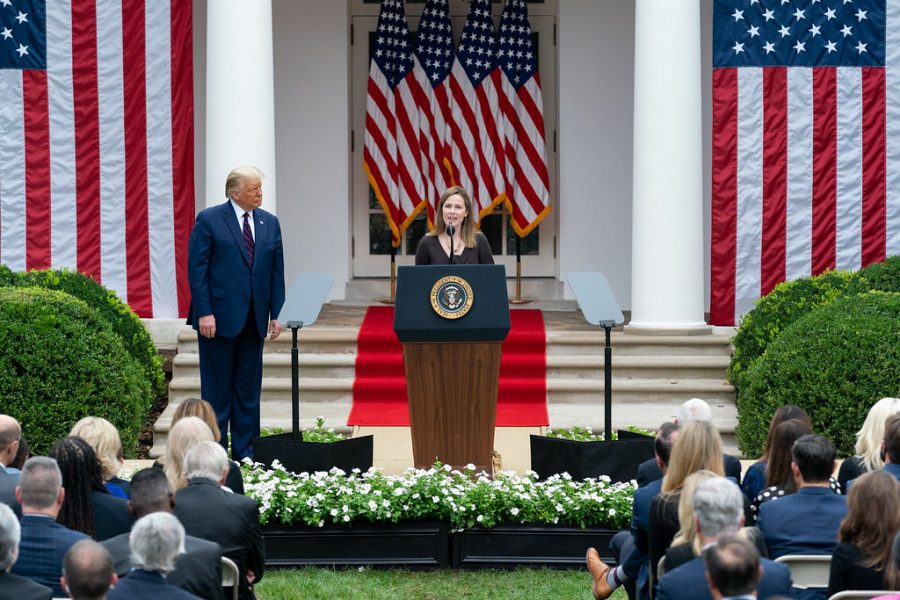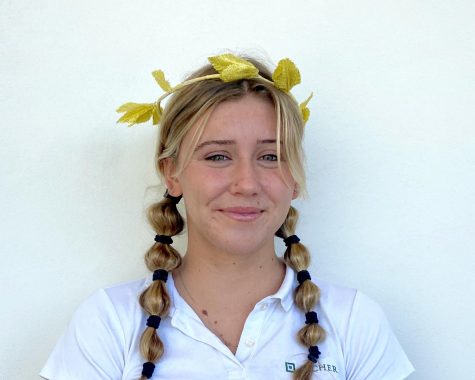Students express ‘frustration,’ ‘worry’ at Amy Coney Barrett Supreme Court appointment
Photo credit: The White House from Creative Commons, licensed for reuse
Amy Coney Barrett addresses the crowd after President Donald Trump announced his nomination of her for a Supreme Court Justice. The nomination event took place at the White House.
December 11, 2020
Following the death of Supreme Court Justice Ruth Bader Ginsburg, President Donald Trump announced his nomination of Amy Coney Barrett to fill the vacant supreme court position. Ginsburg (known as RBG) served on the court for 13 years before her death and said that her “most fervent wish is that [she] will not be replaced until a new president is installed.”
However, Trump nominated Barrett, a federal judge and lawyer, who was confirmed one month later seven days before the presidential election. According to an article in The Observer, students from other schools, like sophomore Charles Yockey who is a member of the College Republicans club, felt that Barrett was a good choice for the next Supreme Court Justice.
“I was very impressed by the nomination,” Yockey said in the article. “I think there are few, if any, more qualified judges in the country.”
Other students from The Observer said that Barrett’s nomination was a “positive thing,” and had hoped she would be picked if there were to be a vacancy in the Supreme Court. Archer students shared differing feelings about the nomination with senior Madis Kennedy noting she felt Trump’s quick nomination of Barrett was a “threat to democracy.”
“Hearing RBG say on her deathbed that she wanted Trump to wait until after the election to nominate somebody and that didn’t mean that if Trump won that she didn’t want him to nominate somebody, it just meant wait until the people decide and I think that was the initial threat to democracy that we saw in 2020,” senior Madis Kennedy said.”Basic human decency would to respect someone’s dying wish. If you can’t respect their policies or their work, as a human, at least respect what they wanted as they died.”
Barrett, who graduated from Notre Dame Law School in 1997, is the fifth woman to be appointed to the Supreme Court, and will serve alongside two of the others: Justice Sonia Sotomayor and Justice Elena Kagan. Barrett’s confirmation created a 6-3 ratio of justices, with a conservative majority for the first time in 70 years.
“I was kind of frustrated, it almost feels like a slap in the face — the argument that yes she’s a woman, but when taking some of her views on things, they’re really against what women have worked for. And just the rights of women in general, and I think that’s really hard to deal with,” junior and Girls Empowering Girls club leader Isabella Specchierla.”Of course we want women to represent the women in our country in our government, but it’s also like we want women to represent women’s freedom and to fight for our rights.”
Barrett has historically approached her interpretation of the law as an originalist, meaning she believes the meaning of the Constitution does not change over time. Concern from the democratic party regarding Barrett’s nomination also stemmed from concern over her stance on Roe v. Wade, which guarantees women the right to an abortion.
“I think my initial reaction to the confirmation was just a little bit of worry because the initial information that was displayed about her is that she was pretty conservative and was pretty religious,” sophomore Georgia Erlich said. “In terms of her political views and past statements and things that she had signed kind of display that she was against abortion, and that’s an issue that I feel differently about.”
Barrett’s confirmation hearing lasted four days, two of which were for senators to question Barrett and additional time for the Judiciary Committee members to hear from legal experts and people for or against her nomination. During the questioning period, Barrett revealed little on her stances towards abortion rights, health care or gun rights, as it would be against judicial ethics to do so since her personal opinions should not influence her decisions as a judge.
“This is the highest court of law. I just really need people in high positions in the United States to be super clear on what their intentions are and super clear on what their position is and on who they are as a person,” Kennedy said. “Ultimately, they’re the leaders of our country. So if we’re not sure what their perspectives are, what their reactions are going to be then we can’t make decisions on whether or not they’re going to be able to do [things] for the good of the people.”
The Supreme Court is the highest court in the country and the nine justices that serve on it serve for life. They judge cases given certiorari, which is a judicial order that a higher court review the decision of a lower court. Specchierla also said that Barrett’s appointment to the court was “frustrating” because of how high her position in government now is, and that she will be replacing Ginsburg. Specchierla also expressed she feels Barrett lacks the qualifications for this position in comparison to Ginsburg.
“I was just kind of disappointed. How could somebody, so under-qualified be able to have this, in my opinion, one of the highest positions in our government, and she’s going to be there for her whole for as long as she wants, pretty much her whole life,” Specchierla said. “It just made me really frustrated, and especially with RBG’s passing, for her to be the next woman to take her place even though she’s a woman, her values pretty much close all the doors that RBG has opened for women. And that just felt really almost insulting.”
As of December 2020, Barrett has not taken part in any election-related discussions or decision in the court, but was recently one of the judges in the majority of the 5-4 decision to stop New York Gov. Andrew Cuomo from imposing restrictions of religious services because of rising COVID-19 cases.
“I’m so so, so happy and so excited that we’re moving into this new era, but the Supreme Court’s a lifelong position and we’re going to be stuck with a lifetime of somebody who’s really just trying to undermine our rights and forward progression of the nation,” Kennedy said.









